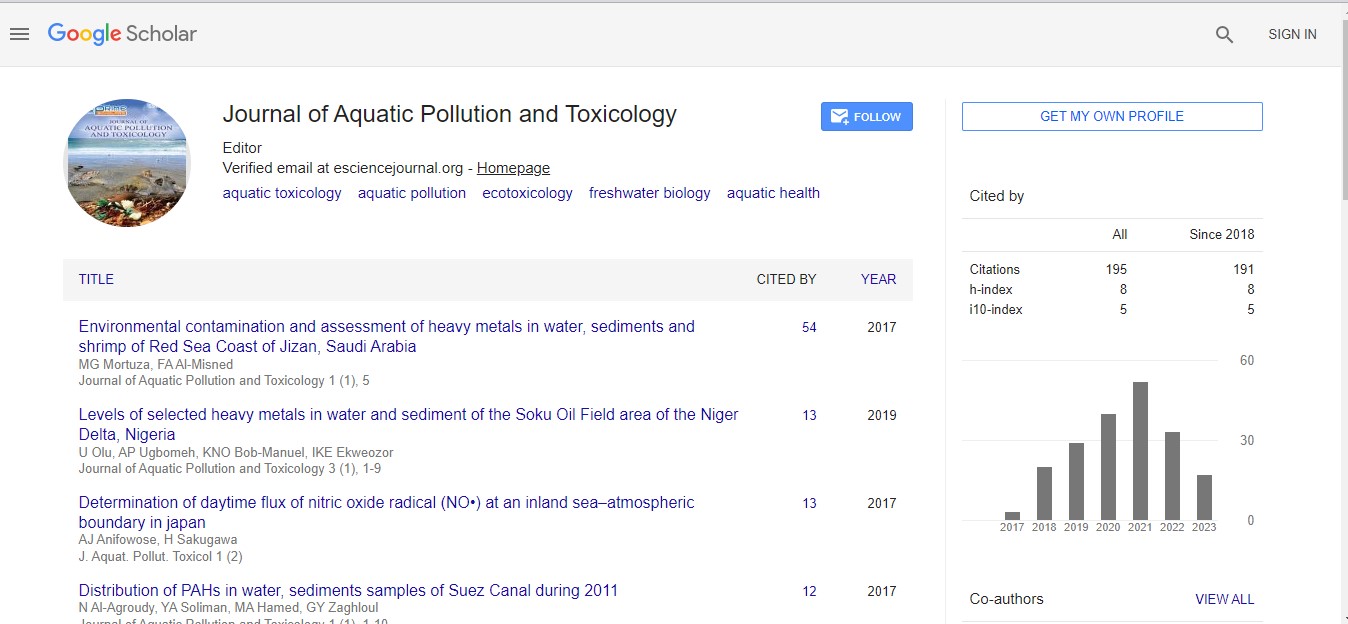Commentary - (2024) Volume 8, Issue 3
Pollution and Toxicology: Unveiling the Impact of Contaminants on Health and Environment
Ming Zhou*
Department of Aquatic Science, Tianjin University, China
*Correspondence:
Ming Zhou,
Department of Aquatic Science, Tianjin University,
China,
Email:
Received: 02-Sep-2024, Manuscript No. IPJAPT-24-21322;
Editor assigned: 04-Sep-2024, Pre QC No. IPJAPT-24-21322 (PQ);
Reviewed: 18-Sep-2024, QC No. IPJAPT-24-21322;
Revised: 23-Sep-2024, Manuscript No. IPJAPT-24-21322 (R);
Published:
30-Sep-2024, DOI: 10.21767/2581-804X-8.3.25
Description
Pollution and toxicology are critical areas of study that examine
the adverse effects of pollutants on both the environment
and human health. As industrialization and urbanization have
surged, the prevalence of pollutants in air, water, and soil has
increased, leading to significant challenges. Understanding
the interplay between pollution and toxicology is essential for
developing effective strategies to mitigate these impacts and
safeguard public health. Pollution refers to the introduction
of harmful substances or products into the environment,
causing adverse effects on ecosystems and human health.
Air pollution is linked to respiratory diseases, cardiovascular
conditions, and premature death. Contaminants like heavy
metals, pesticides, pharmaceuticals, and plastics can pollute
rivers, lakes, and oceans. Sources include agricultural runoff,
industrial discharge, and improper waste disposal. Water
pollution affects aquatic life, disrupts ecosystems, and poses
health risks to humans who consume contaminated water or
seafood. This occurs when hazardous substances such as heavy
metals, chemicals, and waste products contaminate the soil. It
can result from industrial activities, improper waste disposal,
and the use of pesticides and fertilizers. Soil pollution can harm
plant growth, reduce agricultural productivity, and pose risks to
human health through the food chain. Toxicology is the science
that studies the effects of chemicals and other substances on
living organisms. It helps us understand how pollutants affect
health and the environment by analyzing their toxic properties,
exposure routes, and effects on biological systems. Toxicology
examines how the severity of adverse effects correlates with
the amount of exposure to a toxic substance. This principle
is central to risk assessment, which evaluates the potential
harm posed by different levels of exposure. Pollutants can
accumulate in organisms over time, especially in fat tissues.
Some pollutants can cause cancer (carcinogens) or genetic
mutations (mutagens). Understanding these properties helps
in assessing long-term health. Pollution can lead to habitat
destruction, loss of biodiversity, and disruption of ecological
processes. For instance, nutrient runoff can cause algal blooms
that deplete oxygen in water bodies, creating dead zones where
aquatic life cannot survive. Exposure to pollutants can lead
to a range of health issues, from acute effects like poisoning
and respiratory irritation to chronic conditions such as cancer,
neurological disorders, and developmental impacts. Vulnerable
populations, including children and the elderly, are particularly
at risk. Pollution imposes significant economic burdens
through healthcare costs, environmental remediation, and loss
of ecosystem services. For example, treating diseases caused
by air pollution and cleaning up contaminated water sources
require substantial resources. Governments and organizations
implement regulations to limit pollutant emissions, set safety
standards, and promote environmental protection. Policies
such as the Clean Air Act and the Safe Drinking Water Act
are examples of efforts to reduce pollution and safeguard
public health. Advances in technology provide solutions for
monitoring and reducing pollution. Air quality sensors, water
purification technologies, and waste treatment processes help
manage pollutants and minimize their impact. Educational
programs and community initiatives can drive positive change
and promote sustainable practices. Pollution and toxicology
are interconnected fields that reveal the profound effects of
contaminants on health and the environment. By advancing
our understanding of toxic substances, implementing effective
policies, and embracing technological innovations, we can
address the challenges of pollution and work towards a
healthier, more sustainable world.
Acknowledgement
None.
Conflict Of Interest
None.
Citation: Zhou M (2024) Pollution and Toxicology: Unveiling the Impact of Contaminants on Health and Environment. J Aquat Pollut Toxicol. 8:25.
Copyright: © 2024 Zhou M. This is an open-access article distributed under the terms of the Creative Commons Attribution License, which permits unrestricted use, distribution, and reproduction in any medium, provided the original author and source are credited.

